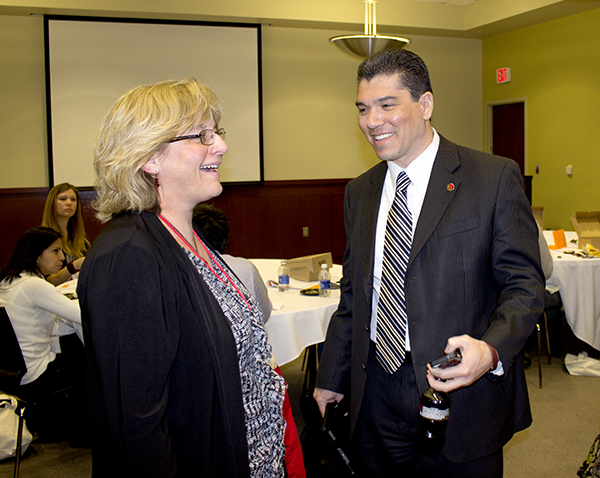The department of mathematical sciences in the J. William Fulbright College of Arts and Sciences developed a learning model for its hybrid courses – some of which will soon be offered completely online – that is drawing attention outside Arkansas. Hybrid courses use both face-to-face classrooms and Web-based technology to deliver education.
Deborah Korth, director of the Mathematics Resource and Teaching Center, accepted an invitation from the University of Texas at Arlington to speak with faculty there last week about using Web-based technology to cover basic, rote learning and face-to-face class time for critical learning, the application of math skills, and group collaborative learning activities.
Korth’s invitation to the Texas campus came as a result of her meetings with Michael Moore, formerly of UT Arlington and now the vice president for academic affairs at the University of Arkansas System, and others at UT Arlington during the University of Arkansas teaching camp this fall.
“They want to learn more about how we do things here,” Korth said. “We have a lot to learn from their campus, too.”
The mathematical sciences department is now working with the Global Campus to deliver the same learning model online. The department plans to pilot completely online courses in summer 2013 and to offer four or five mathematics and statistics online courses by fall 2013. Two or three more online courses will be added in spring 2014.
The center’s leadership team set up a four-semester plan in fall 2012 to enhance hybrid math courses and to start moving some of them completely online. That plan includes technology training.
Math faculty and instructors gathered Monday, March 4, for a workshop to learn how to use the new and advanced features of MyMathLab, which is a series of Web-based learning activities that accompany Pearson math and statistics textbooks.
Representatives from several universities around the state and region were in attendance, including the University of Central Arkansas, University of Arkansas at Fort Smith, NorthWest Arkansas Community College and Rose State College in Oklahoma.
MyMathLab is used in hybrid math classes now and will be combined with Blackboard Learn, the University of Arkansas’ online learning management system, to develop completely online undergraduate math courses.
The leadership team’s enhancement plan includes curriculum development teams, scheduled training in curriculum development and technology integration, researching benchmarked online and hybrid course offerings at peer institutions and constructing meaningful assessments. For example, the membership on the STATS 2303 Principles of Statistics development team includes a professor, an instructor and four graduate students.
Elizabeth Keiffer, a clinical assistant professor, said, “Collaboration between the instructional teams and Global Campus enables us to create a better learning environment for all of our students.”
Javier Reyes, vice provost for distance education, talked with the workshop group, commending its students-first, faculty-driven approach to developing online courses.
“We all have the same objective: to deliver the best quality education that engages the students,” Reyes said. “You have the right plan. If someone is going to lead innovation, it has to be the faculty.”
The mathematical sciences department now offers 11 undergraduate hybrid courses that combine face-to-face class time for critical thinking and application with Web-based homework for rote learning and quizzes, and tests for assessment. Professors Mark Arnold, Edmund Harriss and Janet Woodland are working together to improve and develop an online learning environment for the calculus classes.
Technology to support online quizzes and tests has evolved to support open-response answers to math questions, Korth said. Answers can be numeric, charts, graphs or written paragraphs, not just answering multiple choice questions.
The Global Campus will support the department’s plan to enhance and expand online offerings by funding visiting lecturers, funding training and travel activities, supplying supplemental pay for course development, and providing the help of instructional designers and technical support through the development of online components to be created by faculty.
The Mathematics Resource and Teaching Center is located on the second floor of the Science and Engineering building.
The Global Campus supports academic colleges and schools in the development and delivery of online degree programs and courses from the University of Arkansas. The Global Campus provides a team of instructional designers with offices on the downtown Fayetteville square and in Mullins Library to help faculty build robust online courses that meet or exceed recognized quality standards. For information about the Global Campus visit http://globalcampus.uark.edu.
Topics
Contacts
Kay Murphy, director of communications
Global Campus
479-575-6489,
